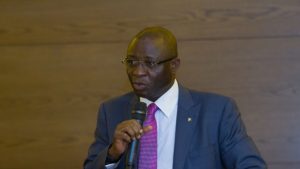Nigeria needs $15bn annually to finance infrastructure deficit

The Managing Director, Sifax Shipping Company Limited and former Chief Executive Officer, Infrastructure Bank Plc, Mr Adekunle Oyinloye, has said Nigeria needs $15bn annually over the next five to six years to close its infrastructural gap .
Oyinloye stated this recently in a paper he presented at the 24th Annual Conference of the Chartered Institute of Stockbrokers, tagged ‘Infrastructure and deficit funding: Bridging the gap via the Nigerian capital market’.
He lamented that Nigeria’s infrastructure sector was grossly underdeveloped, with limited access to social services and significantly increased cost of production and trade.
He announced that the value of Nigeria’s infrastructure is currently about 35 per cent of Gross Domestic Product, very low in comparison with 70 per cent for economies of same size, and public infrastructure expenditure as a percentage of GDP was at 3.5 per cent.
He explained that “Infrastructure financing cannot be met through public resources alone as it will be crippling to the economy in the era of fiscal constraints. With the estimate that the country needs to fund about 18 per cent of its GDP on infrastructural development, it is important to start to look for alternative sources of financing to bridge the deficit.
“This financing is expected to come from local project sponsors, international project sponsors, local banks, international banks, local institutional Investors, international Institutional Investors and multilateral finance organisations.”
Oyinloye stated that the market should be positioned to play a more significant role in infrastructure development with far reaching reforms in the financial sector, stressing that bond issuances encouraged, and foster good regulatory environment to protect investors.
The government cannot be the sole provider of infrastructure projects, he said, adding that the regulators should restructure the capital markets to foster private partnerships to contribute towards the country’s development through funds mobilisation.
